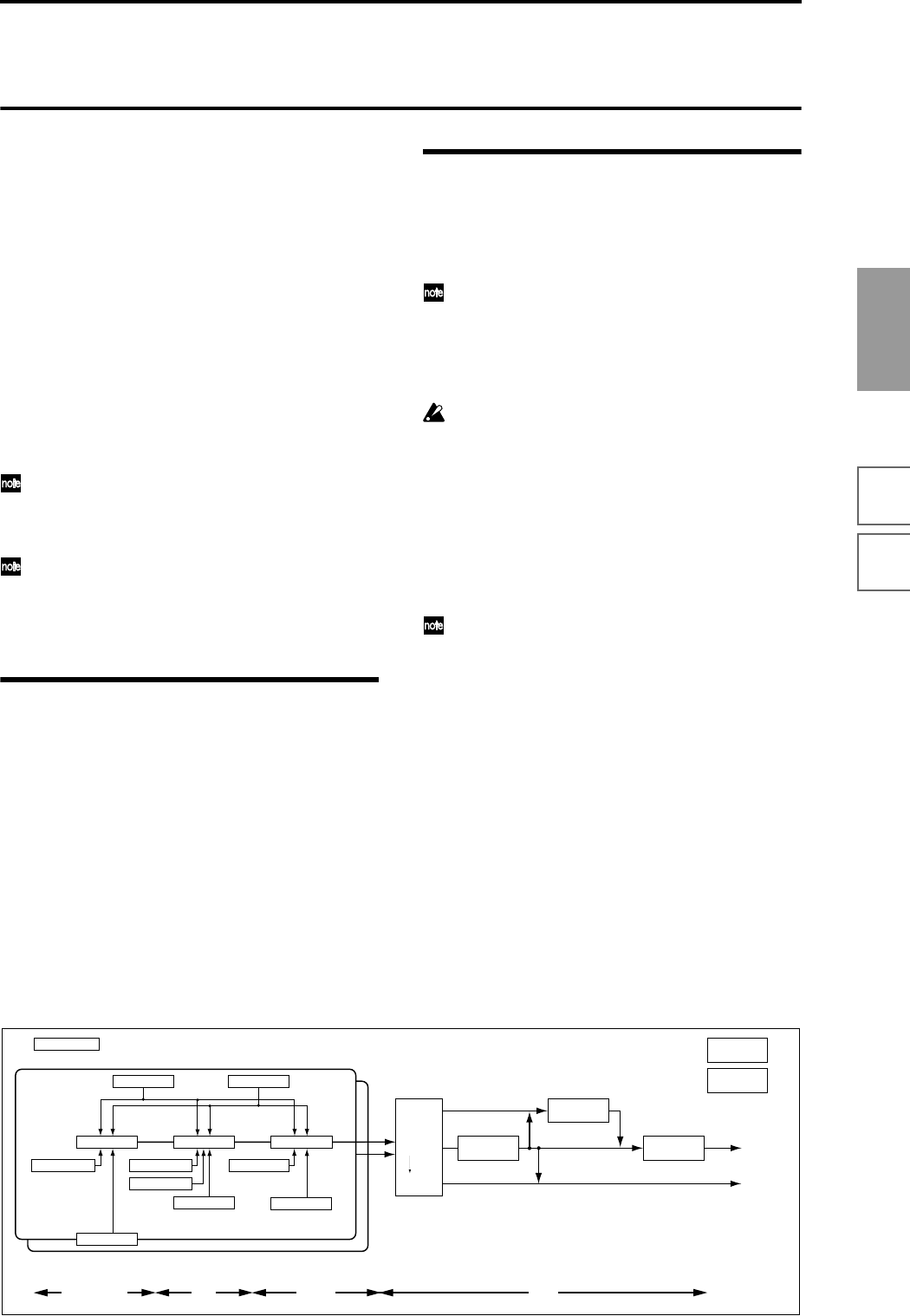
67
Basic functions
Saving dataLoading dataProgram
settings
Combination
settings
Producing
songs
Sampling
settings
Creating a
CD
SMF
playback
System
settings
Drum kit
settings
Arpeggiator
settings
Effects
settings
Other
functions
Program settings
Program editing is performed in Program mode, just as
programs can be selected and played in Program mode.
Program mode consists of the P0: Play–P9: Edit-Master
Effect pages.
In P0: Play, you can select and play programs. You can
also perform simple editing of the program, make arpeg-
giator settings, and make settings for audio input and
sampling. (☞p.22, 34, 45)
In P1: Edit-Basic–P9: Edit-Master Effect, you can edit the
parameters of the program you selected in P0: Play.
When shipped, the TRITON STUDIO contains numerous
preloaded programs. You can edit the settings of these
preloaded programs to create your own original pro-
grams. You can also create original programs that use
sampled waveforms and multisamples that you sampled
on the TRITON STUDIO or loaded into the internal sam-
ple memory (RAM) in Disk mode.
You can perform sampling/resampling in Program
mode (☞p.45). You can also apply the TRITON STU-
DIO’s effects to an external audio input, for a wide
range of possibilities. (☞p.143)
All transmission and reception of MIDI data in Pro-
gram mode is performed on the global MIDI channel.
The global MIDI channel is set in Global P1: MIDI
“MIDI Channel.”
How a program is organized
A program consists of the many parameters of P1: Edit-
Basic–P9: Edit-Master Effect. The diagram below shows
the structure of a program.
Basic program editing
You can edit the preloaded programs (banks INT-A–INT-
D) that the TRITON STUDIO is shipped with, or you can
start with an initialized program (banks INT-E, EXB-A–
EXB-G) to create an original program.
The P1: Edit-Basic–P5: Edit-Common LFO parame-
ters, which are set independently for oscillators 1 and
2, can be copied using the page menu command
“Copy Oscillator.” This is useful when you want to
make the same settings for both oscillators, or when
you want to copy settings from another program.
If you wish to save an edited program into internal
memory, be sure to Write the program. (☞p.56)
In this section we will give examples of how to modify
representative parameters in each page.
For details on all parameters, refer to in the PG p.1–.
Programs you edit or create can be written into the 1,536
program memory areas of banks INT-A–INT-E, EXB-A–
EXB-G.
You can also save and manage programs on various types
of media. (☞p.59)
If the EXB-MOSS option is installed, you will be able
to use the special bank INT-F. The parameter struc-
ture of bank INT-F programs is different than that of
the other banks. Refer to the EXB-MOSS owner’s
manual.
OSC Basic : P1 - 2,3
Filter1(A/B) : P3 - 1
Amp1 Level/Pan : P4 - 1
Pitch EG : P2 - 3
Filter1 EG : P3 - 4
Amp1 EG : P4 - 3
OSC1 LFO1 : P5 - 1
OSC 1
OSC 2
Filter1 Mod. : P3 - 2
Filter1 LFO Mod. : P3 - 3
OSC1 Pitch Mod. : P2 - 1
OSC1 LFO2 : P5 - 2
Amp1 Mod. : P4 - 2
Program Basic : P1 - 1
Insert Effect 1 ... 5 :
P8
AUDIO OUTPUT
L/MONO, R
Master Effect 1, 2 :
P9
AUDIO OUTPUT
INDIVIDUAL 1,2,3,4
MasterEQ : P9
Oscillator / Pitch
Filter
Amplifier
Effect
Controller Setup:
P1 - 4
Arpeggiator : P7
OSC1,2
Insert Effect
Master Effect
Individual Output
Routing : P8-1
P1–1 and P2–2 etc. indicate the page tab screens used when editing on the TRITON STUDIO.


















